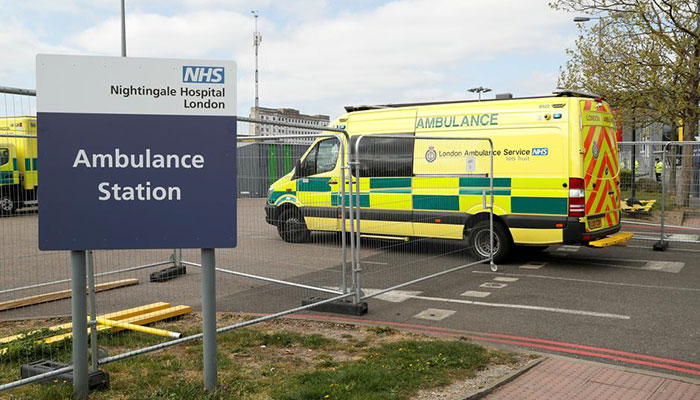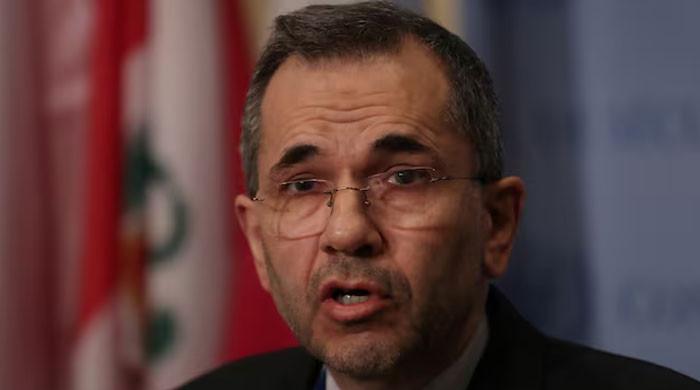At-least 300 British-Pakistanis have died of coronavirus, shows NHS data
More than 18,000 British people have died of the disease so far
April 23, 2020

LONDON: At least 300 Britons of Pakistani origin have died in the United Kingdom from coronavirus, new data released by the National Health Service (NHS) shows.
The information released by the UK health authorities shows the breakdown of deaths by ethnicity in hospitals in England where the patients tested positive for COVID-19 at the time of death.
More than 16% of people who had tested positive for coronavirus when they died were from black, Asian and minority ethnic (BAME) communities, the data revealed.
Out of 13,918 total deaths till 19 April, 10,244 were white and 2,252 or 6% were BAME. The remaining 10% of deaths had no known ethnic origin information.
Of the BAME groups, there have been 420 deaths of people from Indian origin, the highest number of any ethnic groups making 3% of the total number of deaths.
This is followed by 407 black Caribbean deaths, 287 Pakistanis, 263 Africans, 217 from other Asian backgrounds, 131 black, 89 Bangladeshis, 50 Chinese and 388 from other ethnic groups.
The statistics were released days after a review was announced to examine what appears to be a disproportionate number of BAME people who have been affected by COVID-19.
According to reports received by Geo News, since the release of data by NHS on 19 April 2020, more than 15 Pakistanis have died due to COVID-19.
According to the 2011 census, black and Asian people make up 10.8% of the UK population, meaning a greater proportion of deaths are coming from BAME groups.
Health Secretary Matt Hancock has said: "We have seen, both across the population as a whole but in those who work in the NHS, a much higher proportion who have died from minority backgrounds and that worries me.”
"I pay tribute to the work they have done, including those who were born here, moved here, and given that service to the NHS,” he said, adding "it's a really important thing that we must try to fully understand."
Doctors have said preexisting inequalities in the healthcare sector may be a reason why more ethnic minorities seem to be affected.
Dr David Bailey, from The British Medical Association, said the difference in the number of BAME doctors being affected is “stark” and called for an investigation.
“We need to know that because we need to be able to advise our members whether or not they need to treat themselves differently in terms of their risk profiles,” he said.
More than 18,000 British people have died of the disease so far, and the country is now in its fifth week of a lockdown that stops most people from leaving home other than to buy food, exercise, or undertake essential work.
British-Pakistani MP call for probe into BAME deaths
British-Pakistani parliamentarian Yasmin Qureshi and other lawmakers have asked Hancock to investigate whether the members of ethnic communities in the UK and the NHS staff were more vulnerable to the coronavirus outbreak.
The MP for Bolton South East, in her letter, urged the top health official to investigate the issue urgently to ensure steps are taken on time to address why more BAME (Black, Asian and Minority Ethnic) community members are among those critically ill.
The BAME community is 13% of the UK population.
She also asked the government to set up a task force to explore data to better understand these patients.
She further stated that no one is immune from the pandemic but structural inequalities mean that some groups will bear the brunt of COVID-19 more than others. “Socio-economic factors and cramped housing within the BAME community could be a major factor of the rise in COVID-19 cases,” she noted.
The MP demanded a probe to ascertain facts regarding alleged inequality within the NHS and ensure support for BAME staff, which make up 44% of medical personnel in the service.
Recent research into the first British patients to contract COVID-19 has shown that the BAME community is more likely to be seriously impacted and end up in critical care.
The study conducted by the Intensive Care National Audit and Research Centre found that out of nearly 2,000 coronavirus patients, 35% were non-white.












